Daniel Clowes, a comic book artist who portrays American pathos: ‘I am angry and appalled’
The cartoonist returns to his early work with ‘Bola Ocho Integral,’ the Spanish edition of ‘Eight Ball.’ He was recently in Madrid for a talk and sat down with EL PAÍS to discuss the rise of madness into the mainstream
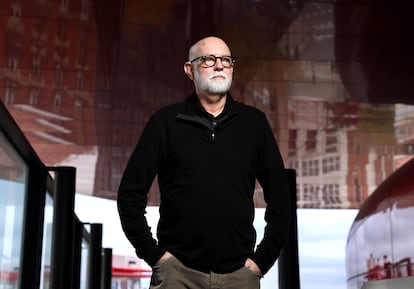

Gritty, populated by downtrodden losers, pathetic and surreal, yet also full of humor and color. No one has drawn the American experience quite like Daniel Clowes, 63, who captured teen rebelliousness in Ghost World and is also the author of the traumatic biography Monica. One of the most relevant cartoonists in the United States, he seems exhausted and frustrated by the current state of his country: “We are looking at the possibility of moving to Europe, just in case. You never know. You just think of Jews in Berlin in 1932. You have to think ahead,” he said in Madrid in early November, before giving a talk at the Reina Sofía Museum that was not coincidentally called Make America Weird Again: “Nobody wants Americans for good reasons. But my wife always tells me: ‘In Europe they value artists, so maybe some country will adopt you.’”
Now that he is presenting Bola Ocho Integral, the Spanish edition of his first comic book Eight Ball, where he published Ghost World, Clowes almost looks back with nostalgia at 1989, when he began publishing comics. That lonely outcast in his twenties saw then that the underground comic scene was the thing that could get him out of his confinement: “The late 80s were really one of the calmest, least crazy eras in American history. It was very boring. I remember at most of the elections back then, the complaint was that both parties were just the same. There was no real choice between voting. And the scandals were nothing compared to today. But you could sense underneath it that there was a madness in America, and that it had always been there. And I was very interested in that madness. I wanted to explore it. Then the madness came up to the top and now it’s released. It has been like a Pandora’s box,” he explains to EL PAÍS.
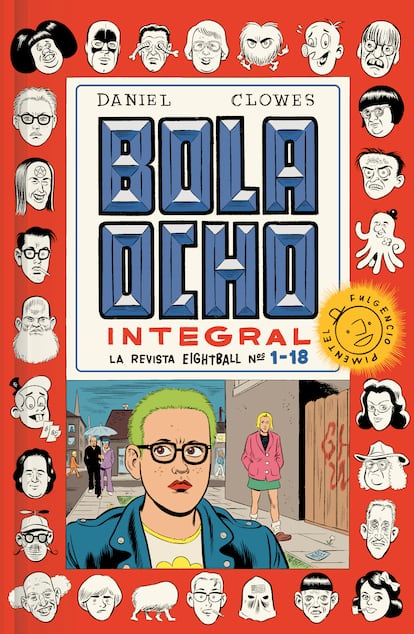
His work explored awkward, complicated characters you wouldn’t want to have a coffee with. Convoluted, surreal plots inspired by film noir, his great hobby. And perhaps none of them made sense or went anywhere. He was experimenting with the genre. He had his own voice, and his comics have maintained that oddity. In Patience, a man from the future travels back in time to bring back his murdered lover. In Wilson, he portrayed a middle-aged sociopath in what’s got to be the most atypical and depressing newspaper cartoon strip ever made.
But he is still surprised by what today’s audiences can believe: “When I went to the supermarket as a child, there were newspapers like The National Enquirer that published things like Elvis’s twin had been discovered in a fetus. And as a kid you think ‘do people believe this’? My mom would say ‘well yeah, some do.’ And you think, well, who are these people? And now they’re half the country. And so it was always there. And it was funny because I was always interested in things like conspiracy theories and all the things that I’m now fighting against. But I do have because of that I have an understanding of cults and conspiracies and all the things that are now mainstream. That has always been there. And I, who was always interested in conspiracy theories, find myself fighting against them. Cults and conspiracies are now mainstream,” something that Monica delved into, and which took him seven years to write.
Clowes has always tried to understand his characters, no matter how complicated and insufferable, and even despite the bad decisions they make. “I tried to depict characters that were sort of oppressive to me, or ones that I related to. My wife and friends, whenever we’re walking around somewhere, they’ll look at somebody and say, ‘That’s one of your characters!’ They’re really out there in the world. The goal is always to inhabit them in a way that you try to see the world through their perspective and try to understand why they make whatever decisions they make. Sometimes I think: what are characters I could never fully write? I couldn’t write like a Nazi prison guard, like someone who’s so evil in a way that’s almost without thought. I can’t get in the head of somebody like that. But a lot of other very antisocial types, I can imagine how they would feel.”
Clowes adds that it would be very difficult to find empathy in an Elon Musk or Silicon Valley. “I couldn’t do it without utter contempt. It would be very hard to find empathy for that. But if it were a developed story, I’m sure I could find some way into it. I mean, they have to have some kind of frailty. Although it seems useless, and maybe they don’t deserve it, I try to understand them,” he reflects.
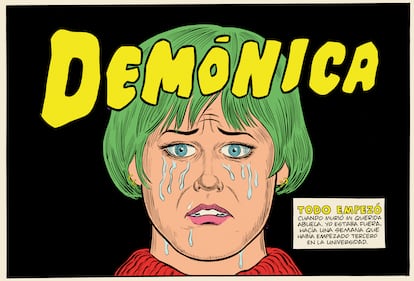
Over time, Clowes left behind the cynicism of youth to embrace a tenderness that he still feels (“you come to realize that there are people and things and principles that are absolutely worthy of all your affection and attention and all the things that you get angry about are just worthy of being ignored”), he finds it difficult to express it at this moment: “I’m a bit too [...] angry and appalled to answer right now,” he replied by email days after his visit to Europe, with Trump now elected president, in response to questions about the election outcome.
“The people in Spain are so much more supportive of the arts and artists than in the U.S., and the culture, as in most of Europe, is far less stressful,” he noted. During his visit he had already spoken about his fascination with the Spanish capital, since he sees in its gritty reality something that reminds him of the dark Chicago of his adolescence where he built his fictional world, although he has been living in progressive Oakland (California) for more than 30 years.
Comics are not made for museums. They should be read in solitude, in a comfortable chair and in silence. That's how you get the emotional connection.”
How has he changed personally? “I was very isolated, very shy, had social anxiety. And just general anxiety. So I was just really in my room a lot, just working all the time. I would sit in front of a sheet of paper and think about pretty women and cool friends, about someone reading me. It was my connection to the world. Today I would have been completely glued to the networks, so I am happy to have grown up with that solitude. At 63 years old and after traveling and seeing a lot, I look back at the young man and I think he made some very good decisions in his art. I feel glad that I had my own vision from the beginning,” recalls this thin, bald man, as he has portrayed himself countless times, who has taken advantage of his stay in Madrid to enjoy several big meals and have a good time.
He recalls that the lonely 12-year-old boy wished that he could share his love for Thor comics with a friend at school, but these were not popular at the time. “And now you see a 50-year-old guy wearing a Thor T-shirt on the street. It’s disturbing. In Europe at least you see adults dressed like adults,” he says, and admits that he stopped collecting and reading Marvel comics when he was 14: “I never looked at them again.”
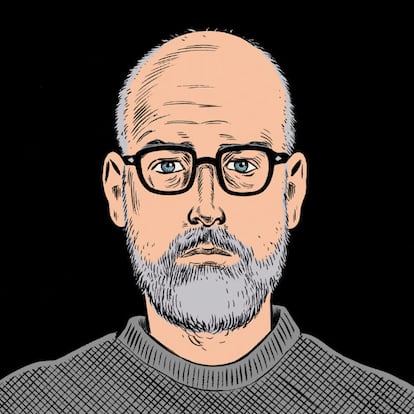
Clowes is particularly critical of society’s emotional drift, and the “frustrating” Gen Z message of only wanting to see characters they can identify with: “It’s just devastating to fiction and to developing critical thinking. The only way to develop perspective and understand characters is to read fiction and the classics, and young people don’t do that anymore. There are people who now read Ghost World and think the characters are mean and horrible. Nobody said that in the first 30 years after it was published; you related to them, they were human. But now people say that ‘the ideals the characters represent don’t relate to my values so how dare you produce them.’ Now you have to censor yourself, so I admire young artists who don’t do that. They’re the ones who in 20 years people will still care about. But all of this self-censored stuff will be completely ignored and it will be looked back on like a huge mistake.”
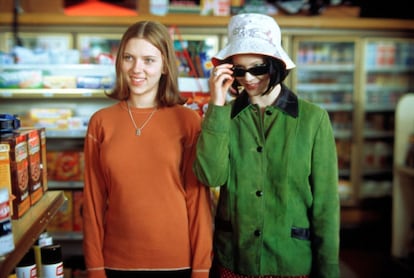
He himself was strange from the start. “I can see in those first issues, I was so tense about making it look professional. I could feel the veins popping on my hand. I felt like my whole life depended on those being good, which it actually did. These days I barely feel the brush in my hand, it’s like a feather,” says this author who still refuses to call his long works graphic novels: “It is silly, pretentious, although the truth is that it has been useful to reach another public. Chris Ware and I tried to come up with a better name and it didn’t work out, we only thought of jokes.” For him, they will always be comics, period, whether in magazine format, serialized or self-contained works for adults.
Although he is now presenting his work in a museum, Clowes still believes that “comics are not made for museums. They should be read in solitude, in a comfortable chair and in silence. That’s how you get the emotional connection.” That and the film he watches every night constitute his refuge from a world that today terrifies him a little more than yesterday. “And it’s going to get worse, with artificial intelligence, all public spaces are going to be polluted. We will end up not knowing if we are talking to our friends anymore. Whoever claims that an AI will produce better art than a human makes it clear that they have no idea what good art is, but it’s like arguing with a Trump supporter. It’s useless,” he concedes.
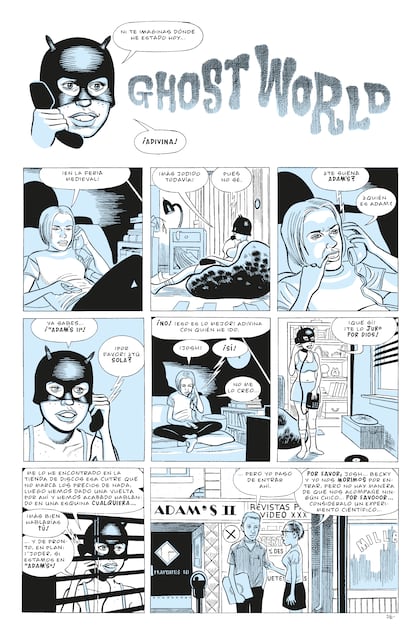
Sign up for our weekly newsletter to get more English-language news coverage from EL PAÍS USA Edition
Tu suscripción se está usando en otro dispositivo
¿Quieres añadir otro usuario a tu suscripción?
Si continúas leyendo en este dispositivo, no se podrá leer en el otro.
FlechaTu suscripción se está usando en otro dispositivo y solo puedes acceder a EL PAÍS desde un dispositivo a la vez.
Si quieres compartir tu cuenta, cambia tu suscripción a la modalidad Premium, así podrás añadir otro usuario. Cada uno accederá con su propia cuenta de email, lo que os permitirá personalizar vuestra experiencia en EL PAÍS.
¿Tienes una suscripción de empresa? Accede aquí para contratar más cuentas.
En el caso de no saber quién está usando tu cuenta, te recomendamos cambiar tu contraseña aquí.
Si decides continuar compartiendo tu cuenta, este mensaje se mostrará en tu dispositivo y en el de la otra persona que está usando tu cuenta de forma indefinida, afectando a tu experiencia de lectura. Puedes consultar aquí los términos y condiciones de la suscripción digital.








































